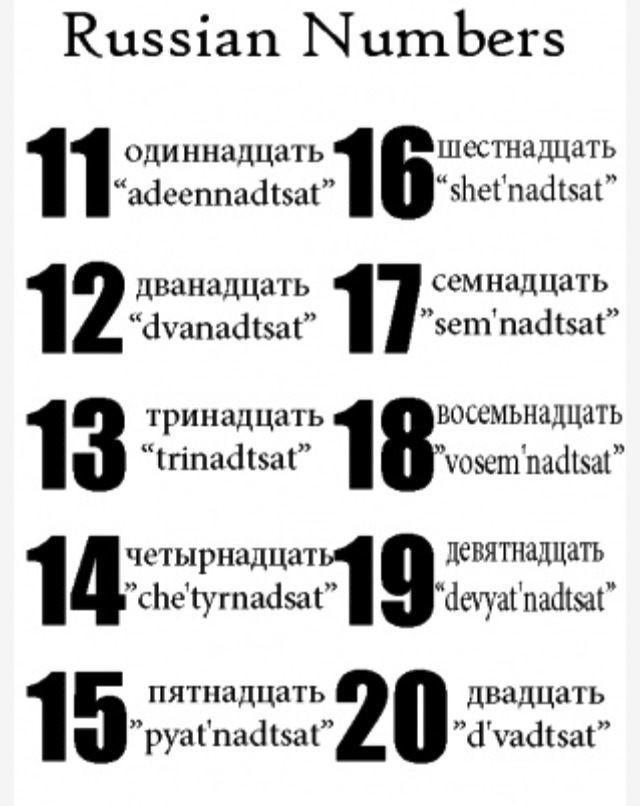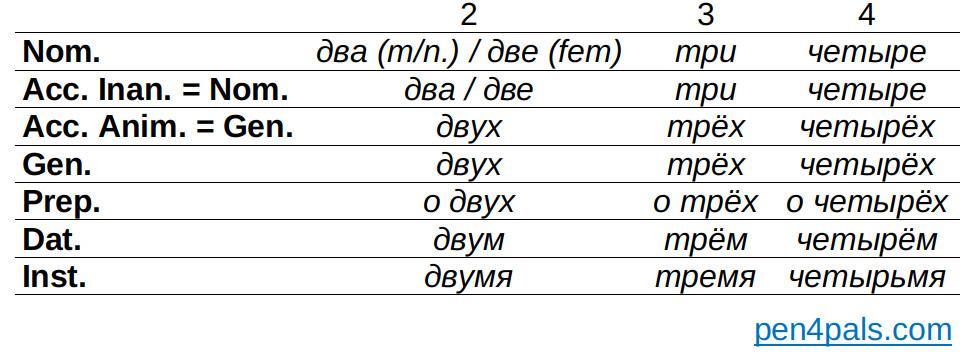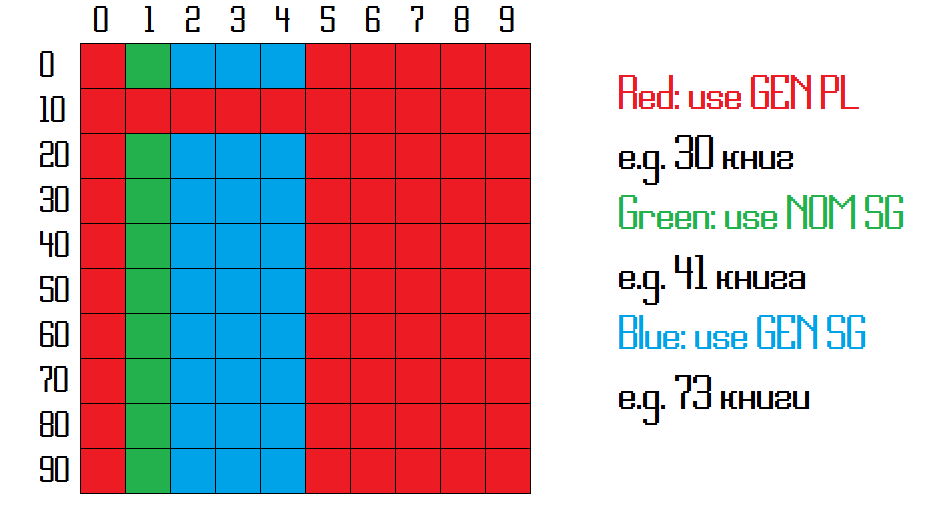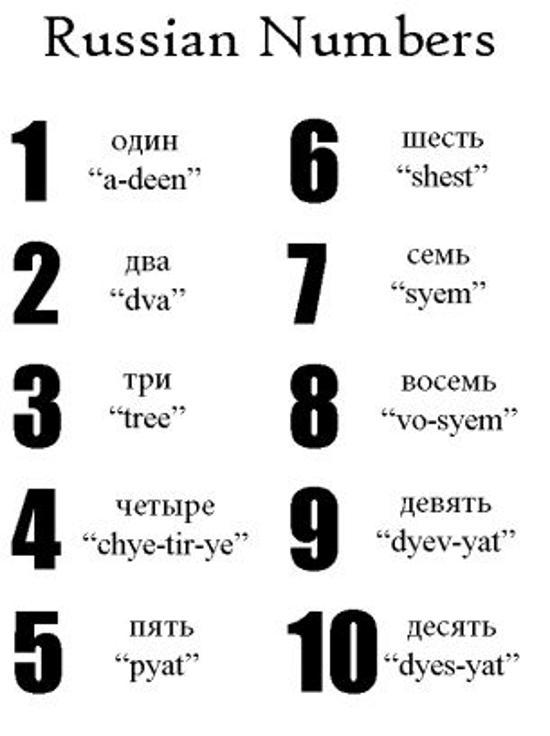In this post I want to talk about numbers and how they decline and which cases you use for which numbers. Because it's not exactly straightforward. So we all start from the beginning.
[adsense:336x280:6538780580]
Number pronounced by native Russian speakers

Self-testing for learning Russian numbers.
Zero, ∅
There are two ways of saying zero in Russian: ноль and нуль.
We used null for phone numbers, game scores and specific times when using a 24-hour clock or military time.
Ноль / нуль -> phone #s, game scores, + specific times when using 24-hr clock.
For example, the train departs from the station at 14:00 hours or 2 o'clock in the afternoon.
Поезд отходит в четырнадцать ноль ноль.
We use null for temperature and mathematics temperature.
нуль -> temperature, mathematics.
So the temperature fell below zero. So zero is pretty straightforward if you have any adjectives or nouns with the zero, with the number zero and all other numbers that end in zero like 20 and 100. You are going to put adjective and noun in the genitive plural.
Температура упала ниже нуля.
adjective + noun in the genitive plural
One, 1
Okay. So now let's look at one. Again that are quite a few words for one. Because one is not a typical number. It behaves like an adjective and it must agree in gender number and case with a noun that it's describing. We start off in the nominative case with:
Один, одна, одно, одни
We have masculine, feminine, neuter and plural it this number behaves like an adjective and must decline like an adjective. Cases or the endings that you have for adjectives with all the different cases are the things that you would have for number one.
- behaves like an adjective (+ must decline like an adjective) and it will agree in gender, number, + case w/ the noun it's describing.
And it will agree in gender, number meaning whether it's plural or singular and case with the noun it's describing. Just like an adjective rate adjective, describe nouns or modify nouns.
Let's look at some examples. In the accusative case:
Accusative case
Remember the accusative case you if it's a masculine anime noun it's going to have the genitive case ending.
Я знаю одну девушку.
We have the accusative case ending for both the number one and our direct object which is the girl.
Я смотрю на одно большое окно.
We see everything agrees: our adjectives agree with our noun.
All right now. Let's look at the genitive case:
Genitive case
Я стою около одного большого дома.
Because of ОКОЛО we need to use the genitive case.
Then we have the dative case:
Dative case
Я подошёл к одному большому окну.
Because of K, we need to use the dative case ОДНОМУ БОЛЬШОМУ ОКНУ.
Instrumental case
Библиотека находится рядом с одним большим домом.
We have РЯДОМ which requires С requires the instrumental in this case: ОДНИМ БОЛЬШИМ ДОМОМ.
Prepositional case
And finally a prepositional example:
Я говорю об одной девушке.
Because of all we're gonna use the prepositional: ОДНОЙ ДЕВУШКЕ.
Одни - plural one
We also have ОДНИ which is the plural version of one.
Plural one and we use ОДНИ when we're talking about nouns that are only in the plural.
Like НОЖНИЦЫ (the scissors) right same in English, it's plural - scissors.
With that, you don't have one scissor.
На столе были одни ножницы.
These are scissors right so on the table there is one pair of scissors
or it can mean:
"only" - На тарелке остались одни крошки.
On the plate that remained only crumbs.
Those are our ones.
2,3,4
Now let's move on to two, three and four.
Here's how two, three and four declines because they're typical numbers, unlike the one which behaves like an adjective and declines like an adjective.
You can look that over in your own time or copy it down. Also, textbooks and any kind of Russian grammar book will have how all of these numbers decline you know every single number.
Table. Russian Numbers 2,3,4 with Cases.

Two, 2 - Два masc./neut., две famine
Three, 3 - Три
Four, 4 - Четыре
---------------------------------------------------
Noun in genitive singular, adjective is genitive plural (masc., neut.), nominative plural (fem.).
Nominative case
Let's write out some examples:
Дом
Два (три, четыре) больших дома.
We've got a masculine noun over here ДОМ.
A big multi-story house and then we have a feminine noun over here.
Дача
A cute little structure out in the countryside, a little country house.
We've got a masculine noun and feminine noun. Let's have some sentences or just do some numbers.
The ДВА because it's masculine БОЛЬШИХ ДОМА and over here with ДАЧА which is feminine we have
Две (три, четыре) новые дачи.
Our noun is in the genitive singular regardless of whether it's masculine, neuter or feminine.
We have ДОМА and ДАЧИ.
Those are both the genitive singular endings and our feminine adjective is a nominative plural НОВЫЕ. Our masculine adjective is genitive plural. We can do one more example.
В этой комнате три больших окна.
ТРИ should be our noun in the genitive singular and it is and our adjective should be the genitive plural because this is a neuter noun ОКНО.
Он купил новые книги.
He bought new books.
We've got НОВЫЕ in the nominative plural because it's a feminine word КНИГА and that's in the genitive singular.
Hopefully, that's a little bit clearer.
Accusative case
The #s themselves (2, 3, 4) + the adjectives take the genitive plural if the noun is ANIMATE.
If the number the noun and the adjective are all in the accusative case the numbers themselves two three and four and the adjectives take the genitive plural
We always have to pay attention to whether the noun is animate or inanimate when we're talking about the accusative case but now it doesn't matter if it's masculine or feminine but we matter whether it's a table and not alive or if it's a little boy and alive.
Мы видели двух мальчиков и трёх девушек.
Everybody is in the genitive plural and you can refer back to this chart to see how 2 3 & 4 declines.
The numbers themselves are in the accusative animate which is the same as the genitive plural case and our boys are in the genitive plural and our girls with their ending are in the genitive plural.
But if you are talking about a compound number.
* 22, 34, 103 all compound numbers follow the rules of 5 + up numbers.
This rule this accusative animate rule is only true if you're talking about the number 2 3 or 4.
That's a little disclaimer.
Other cases
2, 3, 4 - modifying a noun in another case, they'll agree with that case.
Then if you have 2 3 or 4 and you're dealing with oblique cases or the other cases the rules change again and basically the numbers 2 3 & 4. If they're modifying a noun in another case they'll agree with that case or they'll be in that same case
Genitive case
ОНА прожила в Москве около (this will require the genitive) четырёх месяцев.
We have genitive plural because of ОКОЛО.
Prepositional case
Я говорю об этих двух новых студентах.
Dat.
ОНИ подошли к трём девушкам.
A group of people walked up to three girls and again we've got К ТРЁМ ДЕВУШКАМ because we're in the dative case the number and the noun are in the dative case.
Inst.
Она владеет тремя языками.
We've got instrumental endings alright
Now we're done with 1, 2, 3 & 4 and now let's look at 5 through 20 and all numbers and all numbers not ending in one okay
5 - 20 (+ all #s not ending in 1, 2, 3, 4)
Nom/Acc. both adjective + noun will be in the genitive plural. (doesn't matter animate or not).
На этой улице стоят шесть больших домов.
Мы посмотрели пятьдесять семь иностранных фильмов.
OTHER CASES
Gen. В его коллекции больше двухсот шестидесяти пяти русских фильмов.
Prep. Мы побывали в тридцати трёх музеях.
Dat. Я послала открытки двадцати семи хорошим друзьям.
The instrumental is in a class of its own and you're gonna have lots of times and use
Inst. Что делать с пятью десятью восемью рублями?
What can you do with 58 rubles?
It's pretty complicated but it also starts to make sense and just the more you use each number or here each number you'll it'll fall into place you're probably already using some of these perfectly correctly and you haven't even had to study it or think about it
A chart illustrating how to use nouns with numerals.

